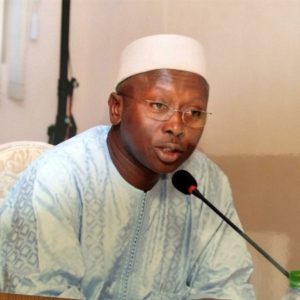
Our colleague Malick Gaye, Executive Director of ENDA Rup in Senegal, a close friend in the HIC Family, passed away recently, on 16 November 2021.
Malick was an integral part of HIC since its inception, representing ENDA Tiers Monde from the early 1980s onwards and ENDA RUP. While representing both organizations he always brought a critical shift in thinking and acted on the imperative need to address urban challenges and environmental justice by drawing on local knowledge, innovation and capacity to organize.
Malick was a charismatic leader and a wise and principled man. He was a tireless fighter and advocate for a more just world for all and especially for the smallest and most marginalised communities. This is the way we will remember him and honour his memory.
Since informing HIC Members and Friends of this great loss, we received and witnessed an outpouring of messages remembering Malick. His departure is felt by all those who have known him across Africa and the world.
HIC will continue to celebrate his memory, to value his great contributions, and to recognize his immense legacy for decades to come.
Forever in our thoughts, may Malick rest in peace, may he rest in power.
Adriana Allen, HIC President, on behalf of the HIC Board and the HIC Community

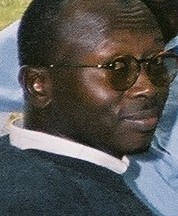
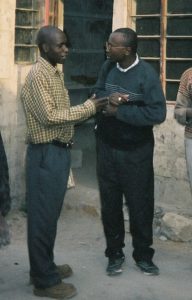
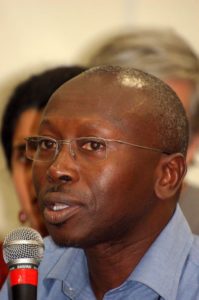
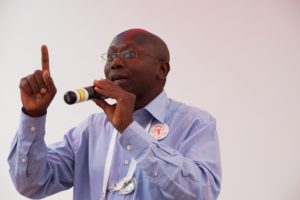
Mr. Malick Gaye was an architect, urban planner and researcher at Enda Tiers Monde – environnement, développement et action since July 1982. Executive Director of the Relais pour le développement Urbain Participé of the ENDA TM Global Network, which obtained Special Consultative Status with the United Nations ECOSOC. He represented the ENDA TM Network after Habitat International Coalition (HIC) since 1987 and at the Limuru Conference in Kenya, as well as in UN-HABITAT. The last International Conference where he was the official Representative was HABITAT III after HABITAT II, to which he contributed his 2nd book “Entrepreneurial Cities” in 1996 after his 1st book entitled “Birth of a City in Senegal”. It was selected and presented as one of the first 25 UN-Habitat Dubai Best Practices at the Dubai International Conference in 1995, preliminary to Habitat II.
He organized the “Dakar Declaration of Solidarity” with the participation of more than 15,000 slum dwellers in the “Campaign on Secure Land and Real Estate Tenure and Good Governance” in 2004, after his participation in the 2001 Launch in Mumbai, India, of the “Global Campaign” under the aegis of Cities Alliance and UN-Habitat, followed by the one in South Africa with SDI.
Between 2006 and 2010, he coordinated a study commissioned by the World Health Organization (WHO) on options for the healthy use of wastewater in urban agriculture for the benefit of the urban farming community in agricultural lands, known as Niayes on Senegal’s maritime coast. He was also co-editor and launched the book entitled “Wastewater Treatment and Urban Agriculture” at the Johannesburg Summit on Sustainable Development (Rio+10) in 2002, based on IDRC-funded action research on the full-scale testing of condominium sanitation systems with treatment of all wastewater and valves at nearly 275 concessions. This system, implemented for the first time by Enda Rup in Senegal with funding from CIDA and qualified as a Best Practice, was subsequently capitalized as a new standard for urban and peri-urban sanitation in Senegal, when seeking alternative solutions for achieving the Millennium Development Goal 7 targets 6 and 11 for sustainable development, which has now become SDGs 6 and 11.
He was the President, for more than 10 years, of the neighbourhood development association of the local collective where he lived and where he welcomed HIC SG Enrique Ortiz and Wandia Seaforth of Mazingira Institute of Kenya in 1991. He coordinated the HIC Focal Point for French-speaking Africa for nearly a quarter of a century, as well as the HIC Reference Centre for the relationship between Housing and the Environment.
Mr. Gaye was a member of the Advocacy Group of the Global Platform for the Right to the City. He was also a member, by virtue of his membership as co-founder, of the AURI network (African Urban Research Initiatives) of the Working Group 2 on Access to Socio-economic Services in the Cities of the South of the Intercontinental Project JWP-Cities Alliance, NAERUS, AURI, REDEUS-LAC.
He was teaching (on a part-time basis) classes in “operational urban planning” at ISIT Africaine (African Higher Institute of Territorial Engineering) and in DESS Master of the module “Cities, Regions and Territories” at ESEA-UCAD – Higher School of Applied Economics at the Cheikh Anta Diop University in Dakar.
Malick leaves behind a beloved family whom HIC extends our sincerest condolences.
Read here the full biography of Malick.

HIC wants to pay tribute to Malick Gaye in this virtual space dedicated to his memory, collecting HIC Members, Friends and Allies memories with such a key and beloved person as him.
We invite you to share those memories or messages by sending them to gs@hic-net.org, and we will incorporate them into this dedicated space in his memory.




Malick: a colleague, friend, brother
I received the news of Malick’s passing with shock and a profound sense of loss. Malick was my colleague and friend since the late 1980s. We never worked in the same organization, but we were colleagues working on many global and local issues. Malick was always in the front line: whether it was appropriate technology, slum upgrading, citizens’ participation or fighting forced evictions – he once contacted me for information on an eviction in Nairobi before the news was out in our local media!
Malick believed in bringing local voices to the global arena on the one hand, and in localizing the global agenda, on the other. In 1995-96, he was very active in the “People Towards Habitat II” approach of HIC to the Istanbul Conference. This included HIC’s fight to get housing rights recognized in the Habitat Agenda as a concept in housing and urban development. When UN-Habitat started the Global Urban Observatories Programme, Malick was involved in promoting Local Urban Observatories. He was also for many years a member of the Best Practices and Local Leadership Programme (BLP). This was a global network of government agencies, local authorities and their associations, professional and academic institutions and grassroots organizations dedicated to the identification and exchange of best practices for sustainable development. The BLP also served as an advisory group to the Dubai International Award for Best Practices to Improve the Living Environment. Malick was important in bringing in best practices from Francophone Africa, among other contributions.
ENDA, Senegal and the global urban development fraternity have indeed lost a giant.
Malick was a good friend and brother, He remembered small things about his friends. I still have some beautiful Senegalese bracelets he brought to Nairobi for me. He had remembered that I had been looking for some very specific colour combinations in the market in Dakar. I remember that in Mexico City when we were once stopped by police at night, Malick was the guy that stepped forward and insisted that the women in the group were not going to be frisked by male police.
Malick was very proud of his family and shared information on their wellbeing and progress every time we met. In many HIC meetings before the advent of cell phones, Malick would be the first to find out where the pay phones were – to call his family. The first time he invited me to a meeting in Dakar, he also invited me to his house for what he called the “more important meeting” to meet his family and eat Thieboudienne.
To Malick’s family, please accept my sincere condolences on your loss. May Allah grant Malick eternal peace, and give you endurance during this difficult time.
Mme. Wandia Seaforth, Nairobi, Kenya
May God grant the family and friends more strength to move on, powered by his vision.
I remember Malick in the General Meetings as an elegant, soft-spoken and learned man, whose gentle manner complemented his strangths and leadership.
Anita L. Beaty
National Coalition for the Homeless
US
¡Que gran tristeza tener que escribir estas líneas!.Tuve la suerte de conocer a Malick y coincidir con él en varias esquinas del mundo, Túnez, Quito, Nairobi… y ya antes había leido de sus contribuciones a HIC y su trabajo en temas medioambientales y de sostenibilidad en favor de las comunidades más desfavorecidas de su entorno. En los últimos años tuve la grata sensación de que Malick vivía una eterna juventud. Siempre jovial, siempre atento y muy participativo. Le agradezco mucho haber estado activo dentro de la región africana y haber ayudado al Secretariado a revitalizar a HIC en la región.
Ahora de repente ya no le veremos rodeado de niños en su casa al finalizar las reuniones y eventos en línea, siempre alargaba la sesión para saludar a los que iban quedando conectados…
Cuando me enteré de su fallecimiento recordé la sensación que tuve al preparar la sección ‘HIC Recuerda‘ de la publicación del 40 aniversario. Recopilar las biografías de gente que había contribuido tanto por los derechos humanos al hábitat y no haber tenido la suerte de conocerlas siempre me dejaba una sensación de tristeza, pero también de orgullo por su trabajo y por poder recordarlo y contarlo.
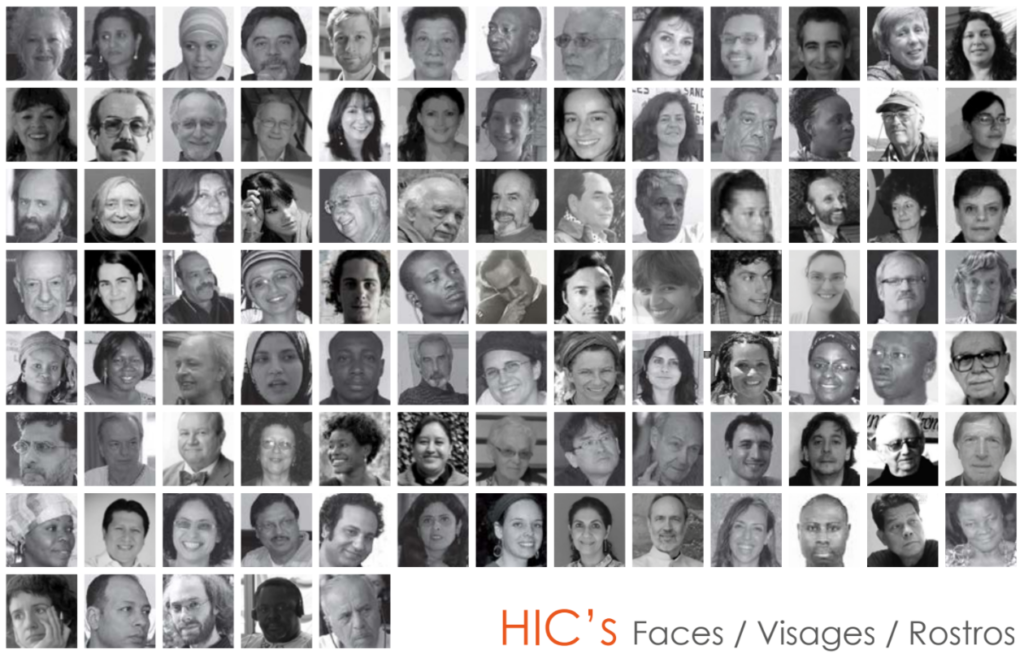
Ahora ya no tenemos a Malick, pero tenemos su legado y su recuerdo, parte del cual se relata en el capítulo ‘Red Hábitat y Ambiente Sustentable de HIC’ de esa publicación. Y en HIC la memoria no se borra sino que se ensalza, para que los que llegamos más tarde sepamos que la lucha comenzó hace muchos años y que hay que continuar.
Mis condolencias a la familia y amig@s de Malick, a los colegas de ENDA-RUP a a toda la familia de HIC .
Un fuerte abrazo a tod@s.
Toutes nos condoléances à la famille biologique, professionnelle et amicale.
Que le tout Puissant console sa famille et tous.
Courage à tous
Siba KOEVOGUI
Directeur Exécutif/ONG ABEF
Rep de Guinée
On behalf of Dajopen Waste Management Project and my Family, we mourn our great leader and mentor Brother El Hadji Malick Gaye and may Yahweh comfort his family for this great loss. Poleni sana .
Kind Regards,
Muguro David Ngige
“Merci infinitement”, as Malick always used to say, are the words that now choke me for not being able to thank him back for his tireless work for human rights, for his kindness and for his great humanity.
Malick has always been an African reference and leader since I joined HIC. He was also very active in the Global Platform for the Right to the City, in the working groups, as a speaker and expert sharing all his experience and knowledge, especially for climate justice.
His passing away is terrible news, but it was a joy and pride to have known him and learnt from him. Malick leaves a better world.
My condolences to the family, his community and the entire HIC family.
Merci infinitement, Malick. Rest in peace.
On behalf of the board of Directors and management of Women Environmental Programme, Burkina Faso, Nigeria, Niger, Togo and Tunisia, we send our heart felt condolences to Malick family and Enda over Malick demise band pray God to receive his soul and grant him eternal rest. Amen
Priscilla Mbarumun Achakpa, PhD
Founder/President, Women Environmental Programme International
Chers amis
Recevez mes condoléances les plus sincères que la terre de saint Louis lui soit légère il partageait avec le groupe de la société civile du Sénégal et était un ami sincère.
Nous avons le regret de vous annoncer le décès accidentel de notre architecte urbaniste Malick Gaye membre de Oasis écolibre et Sénécodev.
Il fut un architecte panafricain patriote et socio-écologiquement responsable. Vous vous souvenez la rigueur avec laquelle il avait exigé une contre-expertise de l’innocuité des matériaux des lotissements que nous avions proposés dans le projet.
Nous sommes donc consternés et présentons nos condoléances à toute l’équipe et à sa famille éplorée.
Mamadou khabib salla
Président de l ONG. Afrique solidarité AISED Dakar Sénégal
incluir profile
What a sad news
I have met our friend Malick few times, but in these conversations , and from the first encounter I felt his commitment deep inside him, however he argued in professional way, mixed with this kind of dignity…he put great efforts in serving needy people and felt their suffering… No more words
RIP
A file retrieved from the archives of Settlements Information Network Africa, operated by Mazingira since 1982.
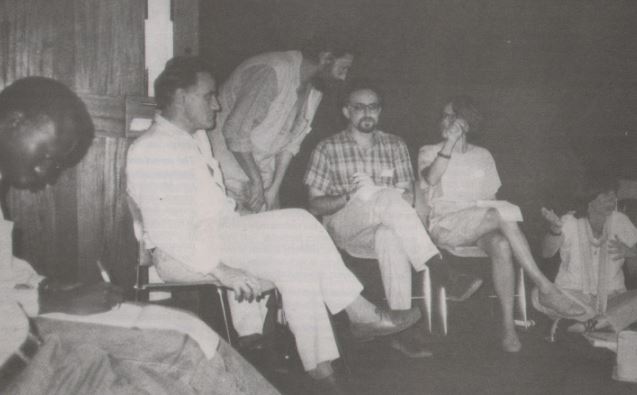
It has a photo of Malick when he attended the HIC Limuru Conference in Kenya in 1987. It is a good historical piece of Malick , notwithstanding his other numerous contributions to the HIC family, as it is at this time that the Habitat International Council transitioned into Habitat International Coalition, or what we could simply commemorate as Malick at Birth of HIC.
May Malick Rest in Power
Mazingira Institute
El Hadji Malick Gaye contested for the Presidency of HIC in 2019. He brought with him a long and honourable history of service to HIC, having been involved since the modern founding of HIC as a democratic, Southern-based coalition of people and organizations during the International Year of Shelter for the Homeless (IYSH-1987). That is where we first met, at the Limuru Conference, outside Nairobi, where HIC was transformed from a “Council” to a Coalition.
I shall personally miss him very much as we formed a solid partnership between Francophone and Anglophone African HIC members that has endured. As the two sub-regional poles, ENDA-Tiers Monde in Dakar and Mazingira Institute in Nairobi collaborated in a principled way to build HIC’s strength and membership in the African region.
Most recently, Malick took on the regional leadership role to begin and to strengthen the digitalisation and social media networking of HIC Africa. In the last year he took the lead in highlighting and redressing the issues raised by the resignation of a HIC Africa Board member.
He has been a global and regional leader on Climate Change issues as well as being grounded in community-based issues of slum dwellers in Dakar and beyond throughout his time with HIC. He led HIC’s environment initiative following the Rio Earth Summit in 1992.
As an unparalleled collaborator and promoter of HIC in the African region and globally, he leaves a gap that can never be filled.
Davinder Lamba
Tribute to Malick Gaye, WUC Champion and Friend
We are profoundly saddened at the sudden death of Malick Gaye, a member of our World Urban Campaign Steering Committee. Malick passed away in Dakar on 17 November 2021.
Malick is one of the founders of the World Urban Campaign launched in 2010 at the 5th World Urban Forum in Rio de Janeiro. He had an immense positive impact when he joined to provide advice and perspective on the strategy to better advocate and engage organizations to elevate sustainable urbanization. In the last two years he chaired the WUC Grassroots Constituency and organized a series of Urban Thinkers Campuses to exchange on water and farming solutions to increase the resilience of vulnerable urban communities.
Malick Gaye was an architect, urban planner and researcher at ENDA Tiers Monde – Environment, Development and Action since July 1982. He has been Executive Director of the Relay for Participated Urban Development of ENDA which has obtained Special Consultative Status of the United Nations ECOSOC. Malick was engaged in key activities of UN-Habitat representing the civil society and grassroots communities. He was also an active player of the Global Habitat Coalition (HIC) since 1987.
Beyond these tangible contributions, Malick was a warm friend and an inspiration for all of us. He was a tireless advocate of the voiceless. He fought for their rights and empowered the most vulnerable in cities and communities.
Malick, Rest in Peace.
Our warm condolences to his family and friends.
The WUC Steering Committee and Secretariat
A la Famille GAYE, ENDA et HIC
Malick Gaye était un ami et collègue dans le cadre de nombreux travaux et événements d’ONU-Habitat. Je l’ai rencontré la première fois à Dakar lors de ma première mission auprès du Gouvernement Sénégalais et de ses partenaires. Le Ministre de l’Habitat d’alors, Amath Dansokho, avait engagé un processus de consultation avant la Conférence Habitat II. Malick était au centre de la mobilisation de la société civile et au coeur du dispositif ENDA, alors très en avance par rapport au reste de l’Afrique. J’ai été très impressionée par ENDA qui est resté un grand modèle pour moi jusqu’à aujurd’hui.
J’ai travaillé ensuite avec Malick sur les observatoires urbains et la collecte d’indicateurs avec les communautés de base. Malick était très engagé. Il avait monté des observatoires populaires, un concept original pensé par Malick lui-même. Les observatoires permettaient aux communautés de s’émanciper face aux combats tels que l’accès aux services de base et au foncier. Par la suite, Malick s’est consacré au montage de la Campagne Urbaine Mondiale, dont il est un des fondateurs, pour renforcer et animer le plaidoyer sur la ville durable. Malick veuillait à ce que la société civile soit engagée. Son leitmotiv était de donner la parole à tous et de garantir la participation des communautés les plus démunies. Il était d’une grande détermination. Toutes ses luttes les plus chères sont aujourd’hui confirmées sur la scène internationale comme les luttes les plus fondamentales de l’humanité devant faire face aux grands défis climatiques.
Nous perdons une âme engagée et profonde, d’une grande humanité.
Toutes mes condoléances à la famille et aux amis de Malick lors de cette dure épreuve.
Christine Auclair
Responsable du Plaidoyer, ONU-Habitat
Head, Advocacy and Campaigns Unit
External Relations, Strategy, Knowledge and Innovations Division
Nairobi, Kenya | NOF Block 3 Level 2 South Wing
Triste de voir partir un des grands defenseurs des droits humains. Paix a son ame, et nos condoleances a sa famille
Judith Hitchman, Urgenci
Chers amis,
J’ai connu Malick Gaye au cours des années 80, notamment au moment de la préparation de l’Année Internationale du Logement des Sans-Abri (1987).
J’ai toujours apprécié sa défense du droit au logement pour tous dans les enceintes onusiennes et son appui constant aux bidonvillois et au secteur informel sur le terrain.
Sa disparition est une immense perte; son sourire, sa chaleur humaine et sa détermination vont nous manquer. Je souhaite que la mémoire de deux grands Sénégalais qui furent aussi mes amis, Alioune Badiane et Malick Gaye, puisse guider les jeunes générations d’urbanistes africains.
Merci de transmettre mes condoléances à la famille de Malick.
Daniel Biau
Ancien Directeur Adjoint d’ONU-Habitat, Nairobi
Amigas y amigos,
Nos entristece la muerte de Malick Gaye, arquitecto y urbanista. Desde 1982, Malick trabajó en la organización panafricana Enda Tiers-Monde, desarrolló una sección de la misma para los temas del hábitat urbano, Enda-RUP. Integró el Consejo de HIC a finales de los años 80 y en los años 90. Adoptó los principios de la Producción Social del Hábitat y los seguía adecuando al entorno de los barrios populares de Senegal, en especial en Dakar y en su ciudad natal de Saint Louis.
Malick asumió el punto focal de HIC para la región de África Francófona por más de 25 años, con muchas actividades de enlace entre Mali, Burkina Faso, Níger, Costa de Marfil, Camerún y Congo. Junto con Davinder Lamba del Mazingira Institute en Kenya, han mantenido mucho trabajo de incidencia en ONU-Hábitat.
Ya retirado en Saint-Louis, Malick viajó a Dakar y sufrió un malestar y una caída durante la pausa de una reunión de Enda, en la sede de Enda que él diseñó hace años ya. ¡Un drama terrible!
Conocí a Malick en la reunión de HIC en Limuru (1987). A menudo a través de los años, nos hemos vuelto a encontrar en múltiples actividades de HIC y de ONU-Hábitat. Al principio, antes de que Malick aprendiera el inglés, lo estuve apoyando a menudo por las barreras lingüísticas de las reuniones de HIC sin traducción simultánea; lo que exigía, ante todo una capacidad de síntesis, dada el nivel muy desarrollado de la oratoria de Malick (se dice que en América latina, hablamos mucho; en África, y especialmente en África del Oeste, de lejos nos ganan).
El legado de Malick en estos países de África del Oeste es grande. Así lo hemos compartido en estos últimos días, especialmente con la familia de Malick, con sus colaboradoras más cercanas, Khady (de Enda-RUP) y Koro (de Copefe de Malí), con Moussa Ka (dirigente de barrios populares de Dakar) quien es actualmente representante de África en el Consejo de HIC, así como con los amigos cameruneses, Franck Olivier y Léon Guy.
Un brindis por Malick!
Saludos,
Ana
Lamentable la partida física de Malick, se nos ha adelantado. Seguiremos su legado de lucha por un mundo más humano y justo.
Saludos a todas y todos.
Edgar Ramírez Velásquez
Muy triste noticia. Un abrazo a la familia y compañeros y compañeras de Malick
Dear all,
We cannot afford to loose the good people in this hard times. My condolences to the family, co-workers, and friends.
Warmly
Sonia
Dear Comrades and friends,
This is really a terrible news. Malick was a powerful activist and have contributed immensely on urban discourse in Africa and beyond.
We extend our heartfelt condolences, and send strength & solidarity to his comrades, friends and family
Rest in power Com Malick Gaye
In solidarity
Chandan K
Dear friends-colleagues,
Our deepest condolences, it is very very sad news. Malick was one of the first GPR2C members I met when I started working at the UCLG-CSIPDHR. It was always great to discuss with him, he will be greatly missed. Our warmest regards and thoughts to the GPR2C community, his family and beloved ones.
In solidarity,
Amanda FLETY MARTINEZ
Queridos amigos y amigas,
Nos da muchísima tristeza esta noticia. Enviamos un gran abrazo a todxs por esta pérdida de uno de nuestros compañeros y en especial a sus colegas y familiares.
¡Nuestro reconocimiento a Malick y su trayectoria en la lucha por un mundo más justo!
abrazos desde Uruguay,
Iva
Reciban nuestra solidaridad por la perdida irreparable de nuestro recordado colega Malick Gaye, incansable luchador por el #DerechoalaCiudad.
Le dedicamos un pequeño tributo vía Twitter :
https://twitter.com/Femum/status/1461705122552193031?s=19
Un abrazo fraterno desde el Sur
Olenka Ochoa Berreteaga
FEMUM ALC-Lab City
Lamentable la partida física de Malick, se nos ha adelantado. Seguiremos su legado de lucha por un mundo más humano y justo.
Dear HIC members,
(see photo) In memory of Malick who was such a good friend and co-worker for so many years (I think we met already in the seventies when Jacques Bugnicourt had started with ENDA in Senegal).
This photo was taken in Berlin early 80s (?) preparing the Berlin HIC HABITAT meeting of 1987. The veterans among us will recognize the pioneers …
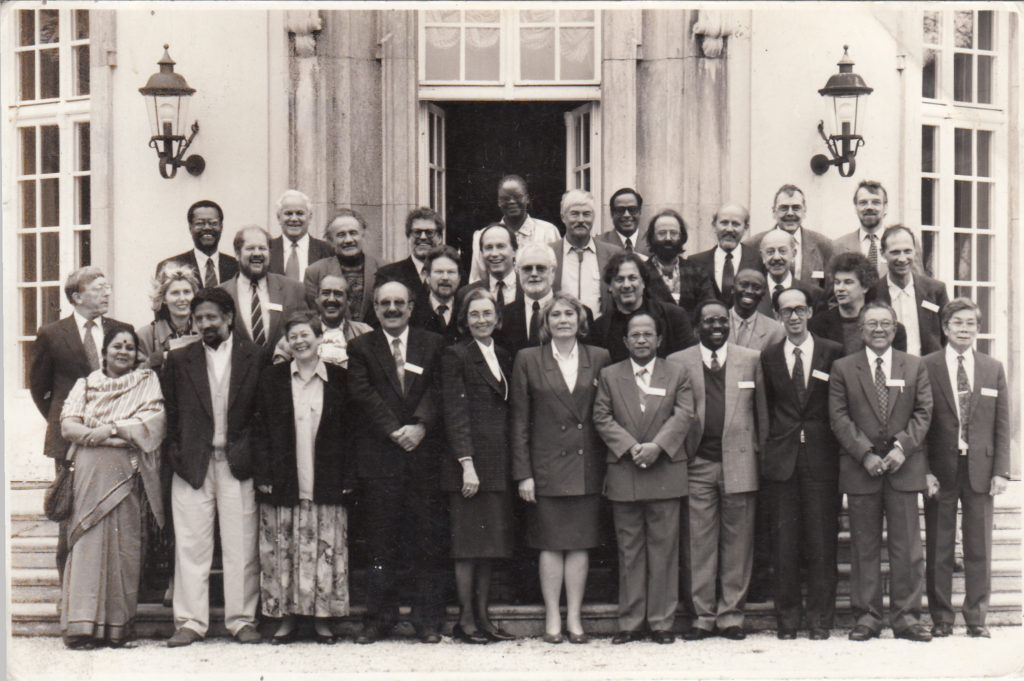
Malick’s so sudden passing away was a great shock to me and to many of us. I met Malick at so many occasions, and as I also was in Senegal working and visiting many times, each time there, we had long chats . I was to meet him in Dakar again this coming January 2022.
We will all miss him.
All the best and enjoy every day, week, month, year of your life.
Han Verschure
Prof. Em.
